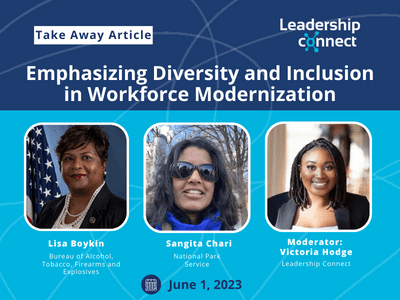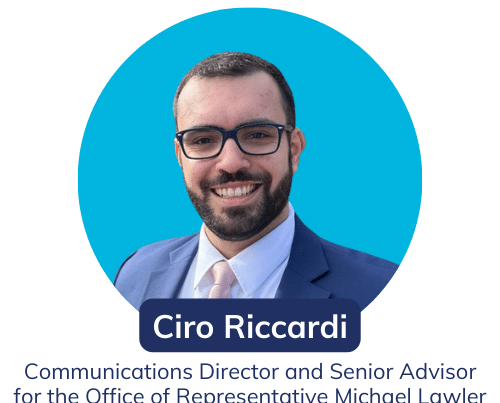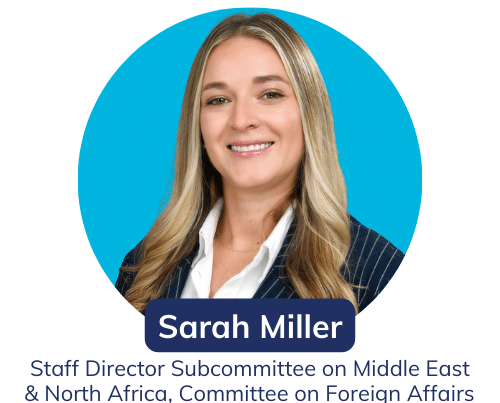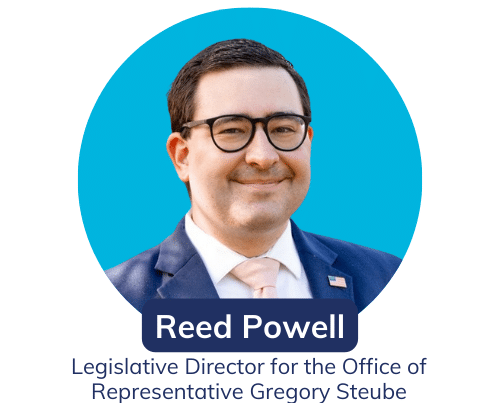
Yesterday, Leadership Connect hosted a webinar centered around Diversity, Equity, Inclusion, and Accessibility (DEIA). Our panelists Sangita Chari, Program Manager at the Office of Relevancy, Diversity, and Inclusion, Workforce Inclusion, National Park Service, and Lisa Boykin, Chief Diversity Officer at the Bureau of Alcohol, Tobacco, Firearms and Explosives (ATF), delved into their own experiences with DEIA at their agencies in a lively discussion moderated by Leadership Connect’s very own Victoria Hodge, Associate Product Manager.
Here are the key takeaways from the webinar:
- A career in DEIA stems from a combination of deep understanding and passion about the topic.
- A successful DEIA campaign fosters a full cultural change from the top down.
- DEIA at the agency level has an impact on the American public in the way stories are told and how communities function.
- DEIA at large makes for a stronger agency that better understands their people and the community they serve.
- From two experts on the topic, the goal of the future of DEIA is for it to be naturally embedded into company culture and regarded as a universal health and wellness issue.
Now that you know the key points, keep reading as we dive deeper into each of the takeaways listed above!
1. A Career In DEIA
Both Lisa and Sangita emphasized that there are endless opportunities to firmly plant DEIA across all federal government agencies. Lisa noted that it is key to be authentically yourself, as doing so will encourage a safe space for others to join you. She noted that you need to be curious and keep uncovering ways to add DEIA policies into the workforce. For example, she and her team at ATF explored their former hiring, recruiting, interviewing, and exit strategies and found ways to include DEIA measurements such as exit surveys and professional development.
Sangita added that one must have a deep understanding of the issue and feel comfortable as the expert for others to come to. She also noted that taking initiative and speaking up when no one else does is another key quality that one must possess to have a successful career in the DEIA space.
2. DEIA at the Leadership Level
Lisa and Sangita both stressed that an agency must have leadership and directors that not only encourage DEIA but enforce it on an agency-wide level. Having this key aspect can help shift the idea of DEIA from something a company “has to do” to something that is embedded in the culture that positively impacts each and every employee. Lisa noted that imploring others to care is a great starting point to making DEIA a more personal issue rather than a data driven endeavor. For example, Lisa noted that after the death of George Floyd in 2020, it was the employees’ experiences and desire for change that led AFT to form a task force to police themselves and reflect as they implemented changes in organizational operations.
Sangita stressed the importance of a more involved leadership team to encourage more reporting and departmental oversight. She also noted that National Parks hosts monthly calls that boast more and more participation as interest in the topic is growing.
3. DEIA From Agencies to The Public
Sangita and Lisa stressed that DEIA is a universal issue, and they demonstrated that by walking our audience through examples of how DEIA measures at their agencies have made a real impact on the segments of the public they serve. Sangita reminded the audience that National Parks hold national and cultural treasures, and their employees are responsible for how those stories get told. They’ve made a conscious effort to not just tell the popular story, but to make sure they are informing visitors of all different narratives as a commitment to diversity. Making sure that accurate and inclusive stories are being told enhances both employee and visitor experiences and, on a larger scale, shifts the narrative of American storytelling in a more inclusive way.
Lisa told our audience that the directors at ATF have a personal commitment to DEIA both at the agency and in the community. They’ve started community engagement programs as they partner with local high schools and underrepresented sections of the community to foster transparency and encourage conversations about DEIA. By facilitating open dialogue with the community, ATF hopes to show the public how they are embracing DEIA to encourage them to do the same.
4. DEIA at Large
At this point in the discussion, our moderator Victoria took a step back and asked our panelist to reflect on why DEIA is important and why federal government employees should even care. Both our panelists simply answered that if nothing else, DEIA makes for a better agency. When all employees feel valued, represented, and important, the agency strengthens internal value and therefore becomes more relevant to the American public. Sangita said that implementing DEIA strategies at National Parks has led to better retention as it has been a way for networks of the agency to connect over a common cause. Lisa agreed that on a larger scale, DEIA facilitates conversations and encourages employee awareness, making them feel more connected to their coworkers and agencies.
5. The Future of DEIA
Our panelist ended the conversation on an optimistic note for the future of DEIA. Lisa stated that she is hoping to see more of the same – that is, more acceptance, more interest, and more open dialogue. Her ultimate goal is that DEIA is no longer a push to implement at agencies but rather a policy that is already in place for people like her to support rather than create.
Sangita wholeheartedly agreed, adding that she hopes that DEIA will be universally recognized as a health and wellbeing issue for employees to feel safer, healthier, and happier.
Missed the discussion? View the panel here.






